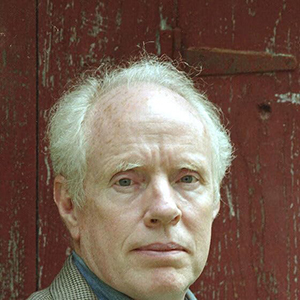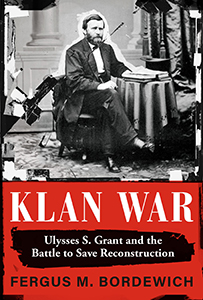Interview with Fergus Bordewich 2


Fergus Bordewich
author of "Klan War: Ulysses S. Grant and the Battle to Save Reconstruction"

Michael Carter
Co-Host
Fergus Bordewich, author of "Klan War: Ulysses S. Grant and the Battle to Save Reconstruction"
Fergus Bordewich's Website
FERGUS M. BORDEWICH is the author of eight non-fiction books: CONGRESS AT WAR: How Republican Reformers Fought The Civil War, Defied Lincoln, Ended Slavery, And Remade America, (Alfred A. Knopf, 2020); THE FIRST CONGRESS: How James Madison, George Washington, and a Group of Extraordinary Men Invented the Government (Simon & Schuster, 2016. Winner of the 2019 D.B. Hardeman Prize), AMERICA’S GREAT DEBATE: Henry Clay, Stephen A. Douglas, and the Compromise that Preserved the Union (Simon & Schuster, 2012. Winner of the 2012 Los Angeles Times History Prize); WASHINGTON: The Making of the American Capital (Amistad/HarperCollins, 2008); BOUND FOR CANAAN: The Underground Railroad and the War for the Soul of America (Amistad/HarperCollins, 2005); MY MOTHER’S GHOST, a memoir (Doubleday, 2001); KILLING THE WHITE MAN’S INDIAN: Reinventing Native Americans at the End of the Twentieth Century (Doubleday, 1996); and CATHAY: A Journey in Search of Old China (Prentice Hall Press, 1991). He lives in San Francisco, CA with his wife, Jean Parvin Bordewich.
Bordewich is a frequent book reviewer for the Wall Street Journal and other popular and scholarly periodicals, mostly on subjects in 18th and 19th century American history. He has published an illustrated children’s book, Peach Blossom Spring (Simon & Schuster, 1994), and wrote the script for a PBS documentary about Thomas Jefferson, Mr. Jefferson’s University. He also edited an illustrated book of eyewitness accounts of the 1989 Tiananmen Massacre, Children of the Dragon (Macmillan, 1990).
He has been an independent historian and writer since the early 1970s. In 2015, he served as chairman of the awards committee for the Frederick Douglass Book Prize, given by the Gilder-Lehrman Center for the Study of Slavery, Resistance, and Abolition, at Yale University. He is a frequent public speaker at universities and other forums, as well as on radio and television. His articles have appeared in many magazines and newspapers, including the New York Times, Wall Street Journal, Smithsonian, American Heritage, Atlantic, Harper’s, New York Magazine, GEO, Reader’s Digest, and others. As a journalist, he traveled extensively in Asia, the Middle East, Europe, and Africa, writing on politics, economic issues, culture, and history, on subjects ranging from the civil war in Burma, religious repression in China, Islamic fundamentalism, German reunification, the Irish economy, Kenya’s population crisis, among many others. He also served for brief periods as an editor and writer for the Tehran Journal in Iran, in 1972-1973, a press officer for the United Nations, in 1980-1982, and an advisor to the New China News Agency in Beijing, in 1982-1983, when that agency was embarking on its effort to switch from a propaganda model to a western-style journalistic one.
Bordewich was born in New York City in 1947, and grew up in Yonkers, New York. While growing up, he often traveled to Indian reservations around the United States with his mother, LaVerne Madigan Bordewich, the executive director of the Association on American Indian Affairs, then the only independent advocacy organization for Native Americans. This early experience helped to shape his lifelong preoccupation with American history, the settlement of the continent, and issues of race, and political power. He holds degrees from the City College of New York and Columbia University. In the late 1960s, he did voter registration for the NAACP in the still-segregated South; he also worked as a roustabout in Alaska’s Arctic oil fields, a taxi driver in New York City, and a deckhand on a Norwegian freighter.
The Book: "Klan War: Ulysses S. Grant and the Battle to Save Reconstruction"
ISBN: 0593317815
Get the bookA stunning history of the first national anti-terrorist campaign waged on American soil—when Ulysses S. Grant wielded the power of the federal government to dismantle the KKK
The Ku Klux Klan, which celebrated historian Fergus Bordewich defines as “the first organized terrorist movement in American history,” rose from the ashes of the Civil War. At its peak in the early 1870s, the Klan boasted many tens of thousands of members, no small number of them landowners, lawmen, doctors, journalists, and churchmen, as well as future governors and congressmen. And their mission was to obliterate the muscular democratic power of newly emancipated Black Americans and their white allies, often by the most horrifying means imaginable.
To repel the virulent tidal wave of violence, President Ulysses S. Grant waged a two-term battle against both armed Southern enemies of Reconstruction and Northern politicians seduced by visions of postwar conciliation, testing the limits of the federal government in determining the extent of states’ rights. In this book, Bordewich transports us to the front lines, in the hamlets of the former Confederate States and in the marble corridors of Congress, reviving an unsung generation of grassroots Black leaders and key figures such as crusading Missouri senator Carl Schurz, who sacrificed the rights of Black Americans in the name of political “reform,” and the ruthless former slave trader and Klan leader Nathan Bedford Forrest.
Klan War is a bold and bracing record of America’s past that reveals the bloody, Reconstruction-era roots of present-day battles to protect the ballot box and stamp out resurgent white supremacist ideologies.